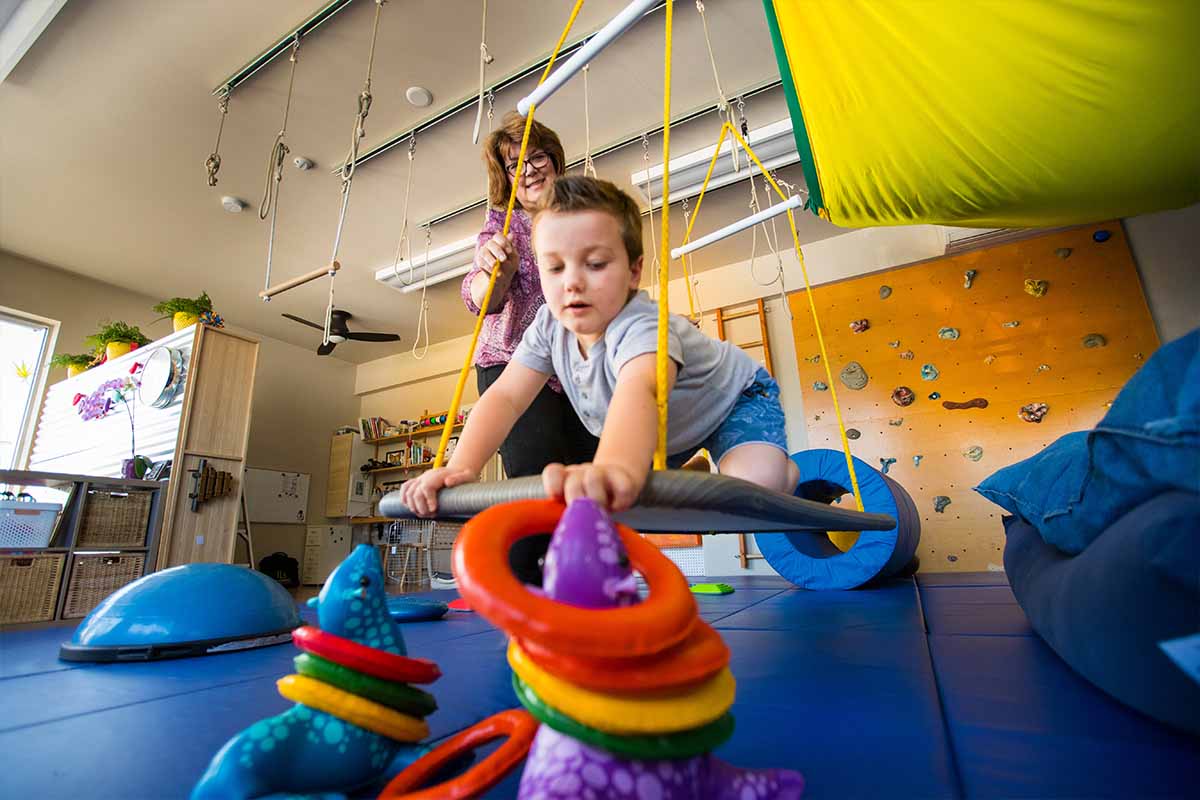
In an inspiring demonstration of community engagement and professional development, five Doctor of Occupational Therapy (OTD) students from the University of St. Augustine for Health Sciences (USAHS) Dallas campus—Carrington Brown, Kennedy Brumbelow, Kendall Keeton, Samantha Paniccia and Bailey Williams—designed an educational course on mental health. They delivered the course to about 30 patients and staff at Pate Rehabilitation.
This program, held on March 27, was an enriching experiential learning opportunity that merged academic skills with real-world application.
Applying Classroom Knowledge to Community Service
The idea for the mental health education course was born out of a neuroscience class, where the students were encouraged by their instructor to volunteer for a project that would allow them to apply their skills in a practical setting. The students set up a time to work with Pate’s patients who had experienced traumatic brain injuries (TBIs).
“This learning process challenged us to use our knowledge and skills from class with a population we have been studying,” Brown asserts.
Neuroscience coursework at USAHS played a significant role in preparing the students for this challenge. “Learning about TBIs helped us to prepare, although we didn’t fully know what we were walking into,” Keeton says. She explains that the group needed to keep things simple and leverage their abilities to present the information clearly and understandably to a diverse audience.
Raising awareness about mental health among individuals with TBIs can have a profound influence on their overall well-being and recovery. “Symptoms of TBIs can result in different behaviors and attitudes,” Brown explains.
“Our knowledge of their experience led us to focus on mental health, a topic not discussed as much but crucial as they transition back into the community.”
Delivering a Comprehensive Educational Program
Building a course for individuals with TBIs came with unique opportunities.
“We weren’t entirely sure what level of functioning everyone would have,” Williams notes. “So, we had to make it simple and straightforward to address everyone in the room.” Keeton adds, “As OT students, we’re familiar with neurological terms, but we had to ensure our presentation was understandable yet engaging.”


The group carefully tailored their content and activities to meet patient needs. The course included education, active engagement in breathing, modified yoga and a discussion of resources.
The students facilitated an activity involving chair yoga, accessible to all with different abilities. “We only had 30 minutes, so we provided resources on YouTube for follow-up so they could implement it into their daily lives,” Brumbelow explains.
Williams adds, “Each of us had a role. Some assisted in the audience while others presented, ensuring a smooth and inclusive session.” She emphasizes the importance of coping mechanisms:
“Therapy can be difficult, and life in general is challenging. Incorporating time and skills to cope with everyday stresses is essential.”
Breathing exercises were a key component of the course. The students taught a breathing technique that could positively affect a patient’s quality of life. “When feeling overwhelmed, taking deep breaths can help you recenter,” Williams says.
The educational sections of the course aimed to be informative and intriguing. The group shared mental health and self-care techniques. “Feedback from patients and staff indicated that they needed a minute to process what we were talking about, so we had to slow it down and ensure our presentation was simple, concise and to the point,” Brown recounts.
Keeton highlights the importance of resource provision: “We made sure to share the 988 Suicide and Crisis Lifeline number and resources from the National Alliance on Mental Illness (NAMI) for future use.”
Reflecting on the experience, Brown shares, “It was cool to see the patients participating and being receptive to the presentation. It felt like we accomplished something meaningful.” Keeton adds, “Volunteering at Pate taught me that empowerment comes from understanding and supporting others during hardship. Discussing mental health is vital in all clinical settings.”


Continuous Commitment to Mental Health Advocacy
Expected to graduate in Spring 2026, the OTD students plan to continue to advocate for mental health in their practice as occupational therapists. Brown has a placement at Pate and is interested in neurorehabilitation. “My capstone project focuses on individuals with TBIs, a population I love working with,” she says.
Williams echoes this sentiment: “We can all implement these exercises with any population.”
“I am grateful that I had the opportunity to spark the conversation at Pate to promote healing,” Keeton concludes.
These students have significantly impacted their community and represent the power of education and community engagement to promote well-being.







